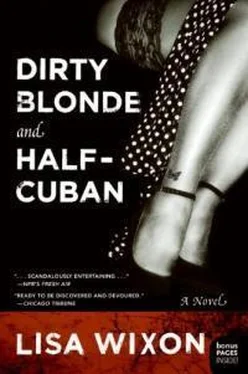Lisa Wixon - Dirty Blonde and Half-Cuban
Здесь есть возможность читать онлайн «Lisa Wixon - Dirty Blonde and Half-Cuban» весь текст электронной книги совершенно бесплатно (целиком полную версию без сокращений). В некоторых случаях можно слушать аудио, скачать через торрент в формате fb2 и присутствует краткое содержание. Жанр: Современная проза, на английском языке. Описание произведения, (предисловие) а так же отзывы посетителей доступны на портале библиотеки ЛибКат.
- Название:Dirty Blonde and Half-Cuban
- Автор:
- Жанр:
- Год:неизвестен
- ISBN:нет данных
- Рейтинг книги:4 / 5. Голосов: 1
-
Избранное:Добавить в избранное
- Отзывы:
-
Ваша оценка:
- 80
- 1
- 2
- 3
- 4
- 5
Dirty Blonde and Half-Cuban: краткое содержание, описание и аннотация
Предлагаем к чтению аннотацию, описание, краткое содержание или предисловие (зависит от того, что написал сам автор книги «Dirty Blonde and Half-Cuban»). Если вы не нашли необходимую информацию о книге — напишите в комментариях, мы постараемся отыскать её.
Dirty Blonde and Half-Cuban — читать онлайн бесплатно полную книгу (весь текст) целиком
Ниже представлен текст книги, разбитый по страницам. Система сохранения места последней прочитанной страницы, позволяет с удобством читать онлайн бесплатно книгу «Dirty Blonde and Half-Cuban», без необходимости каждый раз заново искать на чём Вы остановились. Поставьте закладку, и сможете в любой момент перейти на страницу, на которой закончили чтение.
Интервал:
Закладка:
But while my mother withered away in the clinic, I began to sense a shift in my father. His voice became more stern, his gait more rigid, and when I caught him looking at me, his eyes betrayed a bewilderment and fear. What lay dying on the bed was not just my mother’s life, but my father’s connection to his own.
A few nights before she took her last breath, I awoke next to my mother, the two of us chilly under the antiseptic sheets of the hospital bed. The perfume of jasmine and lilac, her favorite flowers, overwhelmed the air. Aunt June’s head hung off the chair next to the bed, her gentle snore keeping a calm rhythm.
“Darling,” my mother said in a turbulent whisper. “You have to find your father for me, you have to promise you will.”
“He’s down the hall, probably,” I said, climbing out of bed to fetch him, careful not to entangle the tubes and wires that plunged into her skin.
“No,” she said, gently pulling me back toward her. “Your real father.”
Your real father.I told myself the morphine was talking, and not her, but tears of panic welled up in my eyes.
“José Antonio,” she whispered. “That’s his name.”
“No, Mom.” I felt sheer terror. “You’re sick, I don’t understand—”
“Promise me you’ll find him,” she said, reaching for me. She was speaking now with too much certainty, too much like her former self.
“I think you need more medicine,” I said.
“I’ve taken enough.”
I looked over at Aunt June, who’d quietly awakened. “ Dadis my dad,” I said stubbornly.
“I’m sorry.”
“He is,” I insisted, while my peripheral vision folded in on me. “I don’t understand.”
“You will when you find him. You’ll understand then. Please, promise Mommy.”
She used her French-manicured thumb to wipe away my tears. I would’ve promised her anything. Would’ve said anything—if only she climbed out of that hospital-issue gown and back into my life, to resume her role as the woman who loved and protected me. To be my mother again.
“Promise.”
At that, I watched as the door to the hallway closed, and my father, who’d been listening in the darkness, left me alone with the smell of jasmine and lilacs and death.
5
T he Vietnamese believethat when a person dies while young their spirits roam—silently and imperceptibly—through the kingdom of their old lives. That they carry out unspoken conversations with those among the living.
Although my mother was dead, I held more conversations with her than with my father. Upon her death, he returned to South America and placed me at a boarding school near his parents’ home in Connecticut so they could look after me. Part of me believed my father was simply grieving and would one day send for me, and we’d live together again.
Whenever I’d silently tell my mother how sad I was, and how much I missed my father, she responded the same way:
“Be forgiving with him. He does his best.”
My father and I never spoke of that last night in the hospital, or of my mother’s deathbed longing for José Antonio. Though he was an intrepid traveler, the only territory through which my father never ventured was the emotional terrain that my mother had navigated with ease. He had lost more than his wife, and I more than my mother. We’d lost our interpreter.
But that didn’t stop my father from employing a substitute.
“We need to speak,” said his mother, the Briggs family matriarch.
My grandmother wore Nancy Reagan suits and a blonde helmet of hair, each strand bleached and blown and sprayed into submission. She pulled me into her study the summer after my mother died, during a party on the Fourth of July.
“We’re very sorry your mother has passed,” she said, her breath humid with vodka. “But we think it’s best you spend as much time as possible with your grandfather and me, while your father is away and focusing on his career.”
The notion of spending more time with my grandparents tied my interior in knots. My mother must have understood this. When alive, she refused to ever leave me alone with them.
Knuckles tapped on the other side of the door, but my grandmother continued. “I understand your mother said some strange things to you about her time at one of your father’s posts.” At this, she waved her hand nervously. “Cuba, or some such place.” The knock came again, and this time she opened the door.
“Dr. Wagner,” said my grandmother, introducing me to a lumbering man, his inebriated eyes rimmed in red. “This is Alysia. Our granddaughter.” Then she turned to me. “Dr. Wagner has agreed to take a few moments from the party to speak with you about hallucinations.”
For a moment, I was terrified, believing she somehow knew of the conversations my mother and I shared. Or perhaps she could feel my mother’s presence the way I did, and in that very room. But the doctor was there to dispel a much more mysterious notion.
“Hallucinations,” said the doctor, “are quite common in cancer patients.” With downcast eyes, Dr. Wagner blundered his way through a speech about the effects of pain on the minds of those near death.
“So you see,” said my grandmother impatiently, “you must ignore whatever she said to you. It was a figment”—she waved her hand again—“of her vivid imagination.”
“Absolutely,” said Dr. Wagner, taking another drink and refusing to look me in the eye.
My grandmother leaned into me and patted my knee in what felt like a slap. “You’re my son’s daughter. You’re a member of the Briggs family. If you ever say or think otherwise, you will have a very, very difficult life.”
She said this with a smile, but nothing about it was friendly.
6
T his is whatmy father provided: Classes in ballet and French. Medical and dental. College tuition and math tutors—of which there were many. An apartment at the Watergate. Books and pencils. The clothes and accoutrements he deemed necessary to broadcast his family’s stalwart political status.
What I provided my father was the promise to attend his alma mater and study hard for good grades. That I’d complete graduate school and eventually go into the foreign service, following in his footsteps.
Our arrangement was made indirectly, with subtle gestures and inferences, and I never found the courage to test those boundaries with my disobedience. I believed if I just worked hard enough and did precisely what he expected, then one day I could have a relationship with the man who raised me.
Every test, every term paper, every scribbling of notes had been done in the hopes that I could please my father. During the last of my senior finals, I collapsed from a pain gnawing at my right side. Within hours, I was hospitalized with appendicitis, and as they prepped me for the knife to remove the inflamed appendage, I could think only of my mother. She’d died in a clinic just blocks away.
“It doesn’t look good,” said my father over the phone. “I’m on business in New York. I’ll try to make it tomorrow or the next day.”
I told myself it was my father’s fear of hospitals—a phobia developed in the wake of my mother’s painful death—that kept him from seeing me. But truthfully, I barely recognized my father as the same man who read me Curious George stories all those years ago. Or who seemed so alive in the presence of my mother. As the years wore on since her death, he became more like his own Connecticut family and less the man who chose, against his parents’ judgment, a gregarious and effusive Southern woman as his wife.
That night in the hospital, a searing pain jarred me from unconsciousness. Aunt June was snoring, her head hanging from the chair, looking very much the way she did those many nights we held vigil at my mother’s bedside. I started to cry, wanting my mother and father.
Читать дальшеИнтервал:
Закладка:
Похожие книги на «Dirty Blonde and Half-Cuban»
Представляем Вашему вниманию похожие книги на «Dirty Blonde and Half-Cuban» списком для выбора. Мы отобрали схожую по названию и смыслу литературу в надежде предоставить читателям больше вариантов отыскать новые, интересные, ещё непрочитанные произведения.
Обсуждение, отзывы о книге «Dirty Blonde and Half-Cuban» и просто собственные мнения читателей. Оставьте ваши комментарии, напишите, что Вы думаете о произведении, его смысле или главных героях. Укажите что конкретно понравилось, а что нет, и почему Вы так считаете.












